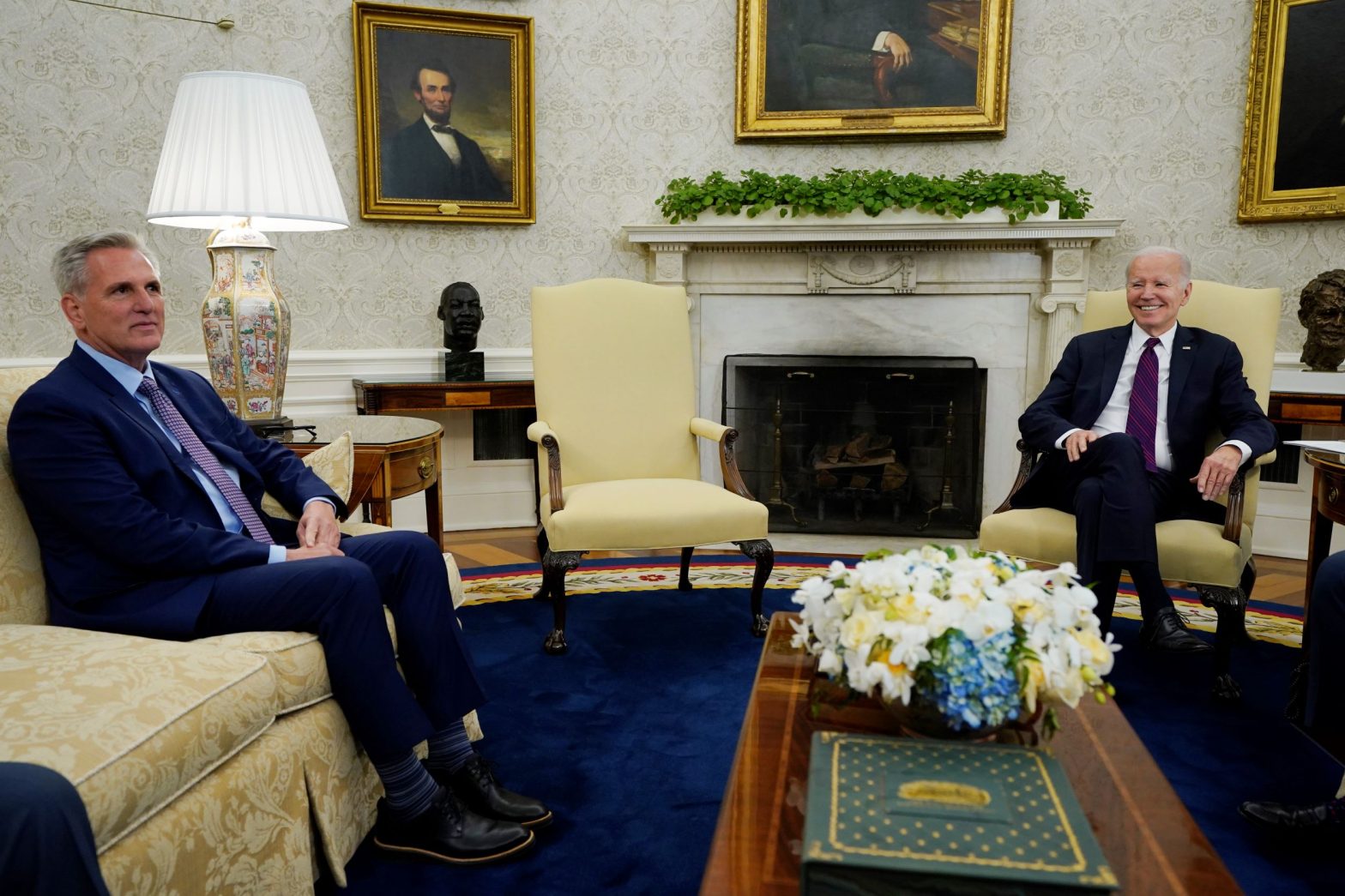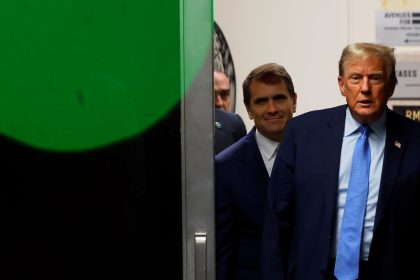Biden, McCarthy Meet for Closely Watched Debt Ceiling Session

WASHINGTON — President Joe Biden and House Speaker Kevin McCarthy, R-Calif., ended weeks of sparring through the media on Tuesday, meeting face to face for the first time since early February to discuss raising the $31.4 trillion debt ceiling.
“We’re going to get started, we’re going to solve all the world’s problems,” Biden said after the in-house press pool was ushered into the Oval Office ahead of what was expected to be a frank and sobering conversation.
Just over an hour later, McCarthy emerged from the White House, telling reporters he “didn’t see any new movement” toward ending a months-long stalemate over raising the nation’s borrowing limit.
Joining the president and House speaker were Senate Majority Leader Chuck Schumer, D-N.Y., Senate Republican Leader Mitch McConnell, R-Ky., and House Minority Leader Hakeem Jeffries, D-N.Y.
Also in the room, standing behind the Resolute desk, were several staffers.
The White House contingent included Chief of Staff Jeff Zients, Shalanda Young, director of the Office of Management and Budget, Deputy Chief of Staff Bruce Reed, Steve Ricchetti, who serves as counselor to the president, and Louisa Terrell, director of the Office of Legislative Affairs.
Coming over from Capitol Hill were McCarthy’s chief of staff, Dan Meyer, Schumer’s chief of staff, Michael Lynch, McConnell’s chief of staff, Sharon Soderstrom, and Gideon Bragin, executive director for the office of the House minority leader.
The meeting came against the backdrop of the highest of stakes — if the White House and Congress can’t strike a deal on raising the debt ceiling, the nation faces the prospect of an unprecedented default on its debts in just three weeks’ time.
As the doors to the West Wing closed behind McCarthy on Tuesday evening there were no signs either side was anywhere close ready to agree to any concessions that would head off a default that Treasury Secretary Janet Yellen has said could come as soon as June 1.
If that should happen, the United States could immediately be sent into a deep recession, and the ripple effect of the default and recession combined would have a serious, destabilizing impact on the global financial system.
Since Biden and McCarthy last spoke, the president has consistently called on Congress to raise the government’s self-imposed borrowing limit without conditions. The Democratic leadership on Capitol Hill, led by Schumer, has reiterated Biden’s call for a so-called “clean bill.”
But McCarthy and his fellow Republicans in the House maintain they will not approve any debt ceiling increase without sweeping spending cuts and a rolling back of several initiatives the Democrats won’t budge on, like investments in clean energy and fighting climate change.
McCarthy said he came to Tuesday’s meeting armed with one simple question for the president: “Does he not believe there’s any place we could find savings?”
Biden has long refused to allow the debt limit to be used to exact budgetary concessions, drawing a line between the debt limit and federal budget negotiations.
On Monday, White House Press Secretary Karine Jean-Pierre told reporters at her daily briefing that the president planned to remind McCarthy that Congress has a constitutional duty to prevent default.
“The president is going to be very clear about that,” she said.
On Tuesday evening, Biden followed through on Jean-Pierre’s statement.
Of course, this isn’t the first fight over raising the debt ceiling and most of them have ended with a last minute agreement in the final hours of negotiations.
Still, even last-minute deals have their implications.
In 2011, an extended tug-of-war between Capitol Hill and the White House resulted in a downgrade of the United States’ previously unassailable credit rating.
This year is promising to be equally tough sledding.
Even as the leaders were sitting down to talk, McConnell’s office was sending an email blast out to reporters reiterating the hard line the Republicans have drawn.
“Seven of the last 10 debt limit increases were attached to bipartisan government spending deals,” McConnell said. “All three of the debt limit increases from 2017 through 2020 were attached to bipartisan government spending deals.
“There’s no reason why our country should be drifting towards crisis. The solution is clear. It’s been clear for months. President Biden needs to negotiate on spending with Speaker McCarthy,” the Senate Republican leader continued.
“The speaker’s been at the table since February. House Republicans are the only people in town who have passed any bill that prevents default. But President Biden has been M.I.A,” McConnell said. “House and Senate Democrats have no plan. No proposal. They have no bill to raise the debt ceiling that could pass either the House or the Senate, let alone both.
“So the choice is President Biden’s. Either he drives the country into default, or he comes to the table,” he said.
Dan can be reached at [email protected] and @DanMcCue
























